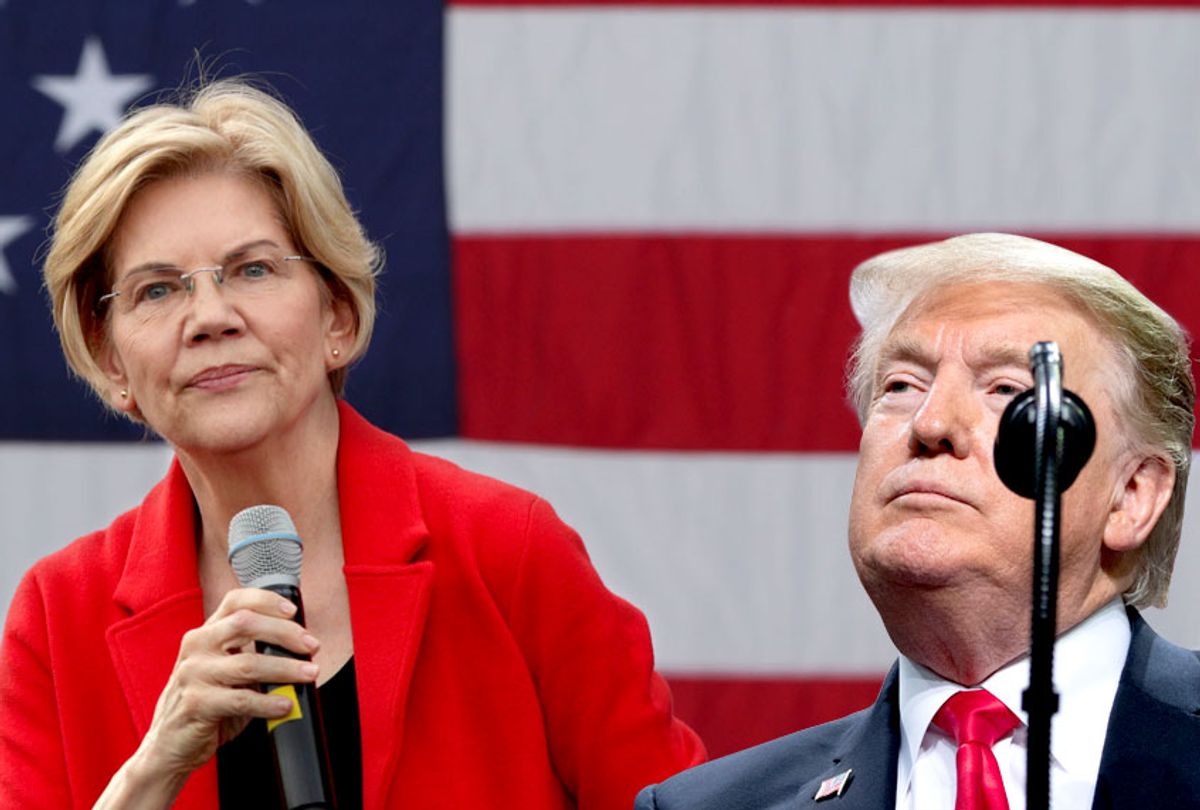Republicans have wrapped themselves in the United States flag for so long that many progressives have understandably come to identify it with imperial bullying, electoral bluster and ethnic bigotry. With his “Make America Great Again” slogan, Donald Trump successfully upped the ante on patriotism by joining anti-immigration rhetoric with his longtime advocacy of protectionist trade policy to promote a nationalist politics that helped him carry several traditionally Democratic states across the Rust Belt.
For years, national Democrats have attempted to erase the Republicans’ perceived edge on patriotism from various angles. Most recently, they've sought to reclaim the language of patriotism to combat growing nationalism on the right. But Democrats’ rhetorical limitations have generally prevented them from spelling out a compelling patriotic logic to compete with protectionism.
Democrats spent relatively little time talking about the economy in 2016, when Hillary Clinton’s campaign attempted to redefine American exceptionalism and greatness as a celebration of increasing diversity — a technique first deployed by Barack Obama at the 2004 Democratic convention — one 2020 candidate has squarely focused her redefinition of progressive patriotism around economic issues.
Calling her platform “economic patriotism,” Sen. Elizabeth Warren of Massachusetts announced on Tuesday a plan to use all the tools at the government’s disposal to reorient trade policy away from capital and toward labor in the U.S.
“It’s time to reject the excuses we’ve heard for decades about why we can’t do more to help American workers,” Warren told a crowd in Detroit on Tuesday. “If we can aggressively intervene in markets to protect the interests of the wealthy and well-connected,” she also wrote in her Medium post, “then we can damn well use all the tools at our disposal to protect the interests of American workers.”
While light on specifics to this point, Warren’s initiative takes direct aim at Trump’s "America First" platform by co-opting its basic premise. Like Trump, Warren called out specific companies by name for outsourcing during a speech unveiling her plan in Michigan.
“America chose to pursue a trade policy that prioritized the interests of capital over the interests of American workers,” Warren said. “We have encouraged companies to invest abroad, ship jobs overseas, and keep wages low. All in the interest of serving multinational companies and international capital with no particular loyalty to the United States.”
She continued: "These 'American' companies show only one real loyalty: to the short-term interests of their shareholders. If they can close up an American factory and ship jobs overseas to save a nickel, that's exactly what they will do — abandoning loyal American workers and hollowing out American cities along the way."
Warren’s echoes of the president's 2016 rhetoric are deliberate. Trump won the White House in large part thanks to his promise to renegotiate trade policies like the North American Free Trade Agreement and the Trans-Pacific Partnership to the benefit of American workers. Warren now says she will make good on Trump’s empty promises to hold U.S. companies accountable for sending American jobs overseas.
"As President, I would pursue an agenda of economic patriotism, using new and existing tools to defend and create quality American jobs and promote American industry," Warren wrote in the plan's roll-out. "My Administration will pursue fundamental, structural changes in our government's approach to the economy, finally putting American workers and middle-class prosperity ahead of multinational profits and Wall Street bonuses."
As a champion for progressive economics, Warren has long recognized that over the last several decades, the U.S. has become a corporate headquarters for the ownership class, driving a global race to the bottom. “Globalization isn’t some mysterious force whose effects are inevitable and beyond our control,” she said on Tuesday. “The truth is that Washington policies ― not unstoppable market forces ― are a key driver of the problems American workers face.”
Warren's rhetorical frame of “economic patriotism" aims to neutralize a Republican advantage that Democrats have long complained about but have never successfully combatted. In a July 2018 survey, Republicans polled nine points ahead of Democrats on their perceived handling of the economy. But Democrats began to gain ground on the issue in the lead-up to the midterm elections, just as Trump’s tariffs began to hurt the proverbial white working-class voters who had switched from Democrat to Republican in 2016. This is the same voter group Democrats are targeting in 2020, on the premise that even small gains in a few key states would likely be enough to retake the White House.
Warren’s “economic patriotism" will certainly be portrayed as radical, left-wing or "socialist" by Republicans. That may indicate that they know they are vulnerable. Trump's rhetoric was effective in 2016, but he has delivered nothing, and Warren's appeal to patriotism now seeks to neutralize his biggest advantage.



Shares